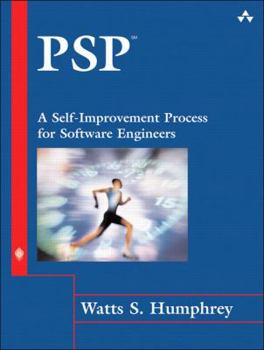Psp(sm): A Self-Improvement Process for Software Engineers
Select Format
Select Condition 
Book Overview
Most software-development groups have embarrassing records: By some accounts, more than half of all software projects are significantly late and over budget, and nearly a quarter of them are cancelled... This description may be from another edition of this product.
Format:Hardcover
Language:English
ISBN:0321305493
ISBN13:9780321305497
Release Date:March 2005
Publisher:Addison-Wesley Professional
Length:368 Pages
Weight:1.75 lbs.
Dimensions:0.9" x 6.5" x 9.4"
Customer Reviews
4 ratings
Very good
Published by Thriftbooks.com User , 15 years ago
If you use this book practices, in your every day work, with discipline and consistency, your performance as professional software developer will improve and your data will show it objectively. In my opinion this is a very good book and an excellent job from Mr. Humphrey.
Excelent book
Published by Thriftbooks.com User , 17 years ago
This book is a great tool to learn how to improve our development process. I'm very happy with my buy.
Applies well in some but not all situations...
Published by Thriftbooks.com User , 18 years ago
As an IT professional and software developer, I'm all for standards and processes. PSP - A Self-Improvement Process for Software Engineers by Watts S. Humphrey (Addison-Wesley) outlines a personal methodology for improving your development efforts. But it's definitely not applicable to all environments... Chapter List: The Personal Process Strategy; The Baseline Personal Process; Measuring Software Size; Planning; Software Estimating; The PROBE Estimating Method; Software Planning; Software Quality; Design and Code Reviews; Software Design; The PSP Design Templates; Design Verification; Process Extensions; Using The Personal Software Process; Index From an overall perspective, I think the concepts in here are good and the book is well-written. Watts has devised a methodology that a developer can apply on their own to improve their coding, estimating, and defect resolution skills. This is done by extensive measurement and recording of statistic and time taken to accomplish certain tasks. These numbers are transferred to forms that can then be statistically analyzed to see the trends and make corrections in your techniques based on personal problem areas. The advantage that this methodology offers is that you don't have to get buy-in from an entire department in order to implement it. Conversely, PSP can be extended to apply to a team development environment in order to improve everyone's ability to work and develop code as a group. Where I start to have issues is that it doesn't translate well to all environments. It's best applied to situations where you're developing programs with actual lines of code (like Java or C++) that allow you to do things like count lines of code, program sizes, or function points. It doesn't address rapid application development (RAD) environments like Lotus Notes/Domino very well, as "lines of code" is often next to nothing. Graphical design techniques that code underlying "plumbing" will make your numbers seem very small. Counting and tracking defects could be useful, but once again you'll often have to ignore stats related to defects per program size. You'll also need to be pretty comfortable with statistics to work with this methodology, as Watts gets into some pretty large formulas to generate the "score" of some of the tracking measures. This is one of those books where if I were coding 15000 line Java programs, I might be really excited. Developing in a RAD environment makes me see a lot of this as unnecessary tracking for tracking's sake. But if you're a "true software engineer" in the most traditional sense, you'll probably find things in here that you'll want to try out.
review before compiling?!
Published by Thriftbooks.com User , 19 years ago
The intent is to reduce the defect rate in software. With an emphasis on doing this when we have several million lines of source code. All the more so if the application might involve safety issues or be critical to its company's bottom line. Humphrey points out that the writing of such large code might typically follow practices used for code bodies orders of magnitude smaller. But that this leads to far too many defects. He explains that PSP offers a discipline for the individual programmer to follow. And how this can be scaled to a team of programmers. PSP stresses investing in design time and review time, relative to the actual coding time. It's big on writing down the times spent on these stages, so that you have actual quantities to see and from which to get metrics. You cannot improve what you cannot measure. The review time is considered a good investment, for finding bugs here is inherently more productive than relying on a downstream testing stage or user feedback. Perhaps the most contentious aspect is whether to do a review of your code before compiling it?! Many will not. After all, the compiler can swiftly find the syntax errors. Why waste time looking for these beforehand? Isn't this a retrograde step? The book's rejoinder is that syntax errors might be considered to be distributed like more serious logic errors. Hence, if you review before compiling, and find 80% of the syntax errors that the compiler finds, then perhaps you only also found 80% of the logic errors. Opps? A simple and ingenious self diagnostic tool. But despite the logic of this, water will flow uphill before any significant portion of programmers adopts this method. Pressing 'make' or its equivalent to do a compilation is simply too easy. The book is on far more plausible ground describing the other aspects of PSP.





